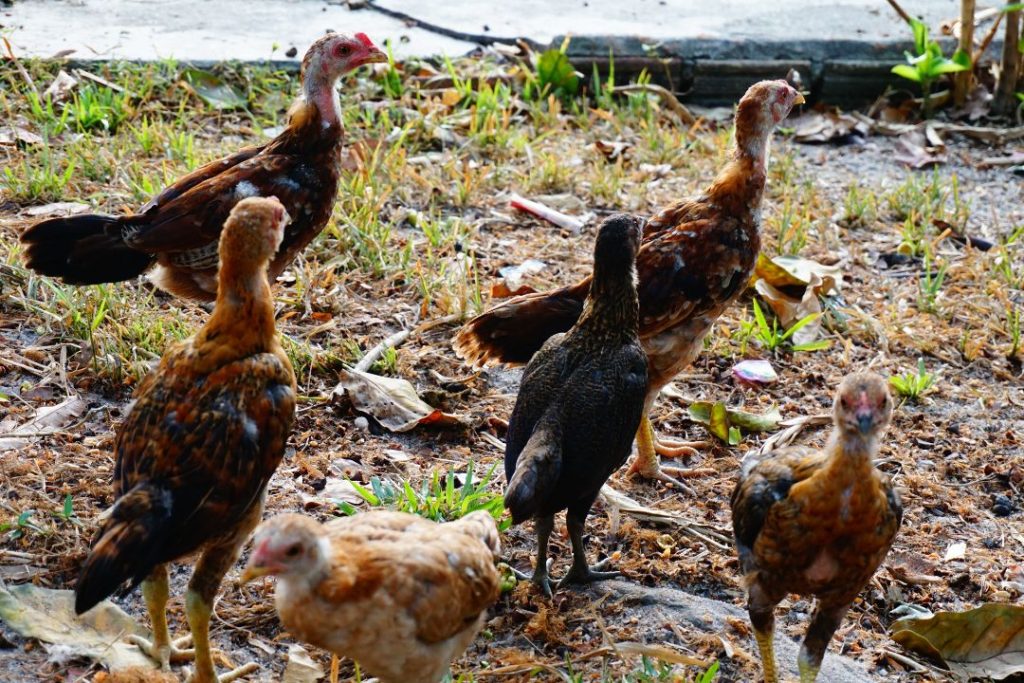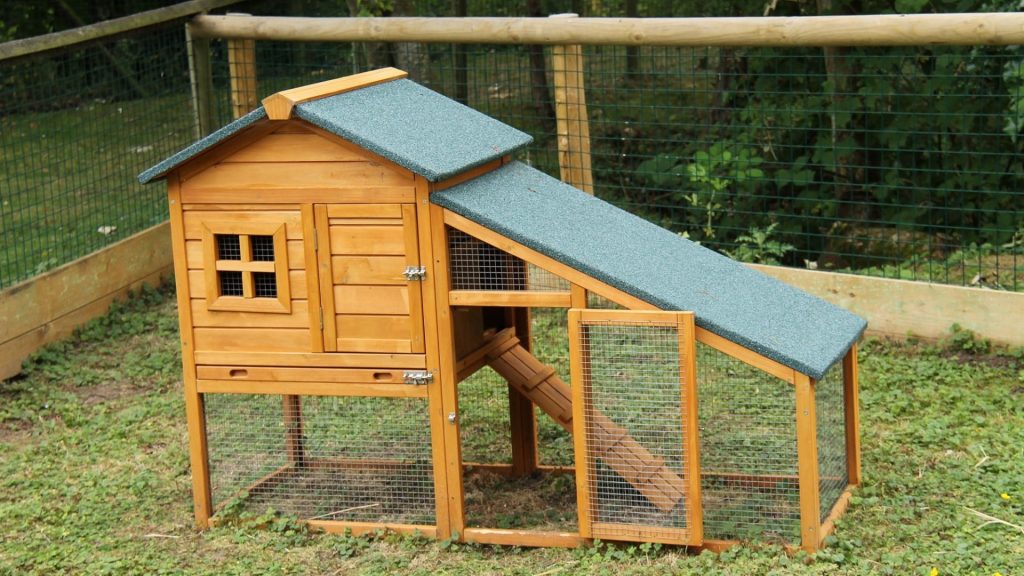Rainy days often bring about a cozy ambiance, urging many of us to retreat indoors. But if you’re a backyard poultry enthusiast, you might have noticed a peculiar sight during these wet spells. You may see your chickens, seemingly unbothered, standing out in the rain.
This observation naturally leads to the pressing question, “Why are my chickens standing in the rain?” Is it out of choice, necessity, or sheer curiosity? The answer is multifaceted.
Your chickens might stand in the rain for various reasons, ranging from natural instincts and cooling mechanisms to the simple allure of the raindrops themselves.
In this comprehensive guide, we’ll delve into the reasons behind this behavior, the potential benefits, and the concerns it might raise. So, keep reading!
Why Are My Chickens Standing in the Rain?
Chickens have their reasons for braving the rain. Whether driven by ancient instincts, the need to cool down, or sheer curiosity, these birds find value in the rain.
So, the next time you wonder, “Why are my chickens standing in the rain?”, remember that they have their reasons, deeply rooted in nature and curiosity.
1. Natural Instincts
Birds, especially chickens, possess deeply ingrained instincts. Over millennia, evolution has shaped their behaviors. Rainy conditions often resemble those found in their ancestral habitats. Wild environments expose them to varying weather patterns, including rain.
Responding to rain might be an echo of their wild ancestors’ behaviors. Survival in the wild often depended on adapting to wet conditions. For chickens, standing in the rain could be a throwback to such times.
Ancestral memory might be nudging your chicken to embrace the rain. In essence, rain doesn’t always signal danger or discomfort for them. Instead, it might evoke a sense of familiarity and security.
2. Cooling Mechanism
Warm days can be challenging for chickens. Overheating is a genuine concern for these birds. Unlike humans, chickens don’t sweat to cool down. Seeking shade is one way they combat heat.
But what if there’s another natural solution? It’s raining. Raindrops offer a refreshing respite on hot days. Each droplet helps in lowering their body’s warmth. By standing in the rain, chickens can maintain a comfortable temperature.
The wetness acts as a natural air conditioner. As water evaporates from their feathers, it cools them down.
3. Curiosity
Ever watched a child experience rain for the first time? Their wonder and excitement are palpable. Chickens exhibit a similar sense of wonder. Each raindrop presents a new sensory experience. The ground transforms, worms emerge, and the world sounds different.
For your chicken, rain alters their environment in intriguing ways. Puddles form, offering reflections and ripples. Raindrops create patterns and sounds on various surfaces. Such changes can be fascinating for an observant bird.
Chickens, being inquisitive by nature, might want to investigate. Standing in the rain allows them to feel each droplet. They can observe the world changing around them. In a way, rain provides them with a playground of new experiences. Their curiosity drives them to understand and engage with these changes.
4. Protection from Pests
Pests can be a constant annoyance for chickens. Mites, lice, and other tiny critters often infest their feathers. Rain offers a temporary reprieve from these pests. As water drenches the feathers, pests lose their grip.
Chickens might seize this opportunity for a natural pest cleanse. The rainwater washes away some of these irritants. Moreover, the wet ground can drown ground-based pests. By standing in the rain, chickens might be taking a proactive approach to pest control.
5. Social Behavior
Chickens are social creatures with complex behaviors. Often, if one chicken decides to stand in the rain, others might follow. This group mentality ensures safety in numbers. In the wild, there’s safety in sticking together.
If one bird deems the rain safe, others might follow suit. Observing their peers can influence a chicken’s decision. So, sometimes, it’s not just about personal preference but social cues.
6. Feather Maintenance
Feathers play a crucial role in a chicken’s life. They provide insulation, protection, and aid in flight. Over time, dust and dirt can accumulate on these feathers. Rain acts as a natural shower, helping chickens clean their plumage.
The water helps remove dirt and grime from their feathers. Post-rain, you might observe chickens preening extensively. This behavior helps them realign their feathers and remove any remaining dirt. In essence, a rainy day can be a spa day for chickens.
7. Sensory Stimulation
Every change in the environment offers sensory stimulation. Rain is no different. The sound of raindrops, the feel of wet ground, and the sight of a transformed landscape can be stimulating.
Chickens might stand in the rain to engage their senses fully. Such experiences can be mentally enriching for them. By immersing themselves in the rain, they’re exploring a dynamic environment.
What Are the Potential Benefits of Rain for Chickens?
Rain, often perceived merely as a disruptor. But it is a boon for chickens in many ways. From providing natural pest control to enhancing their environment, the benefits are manifold. Embracing the rainy season with the right precautions can lead to a thriving, robust flock.
1. Pest Control
When raindrops touch the earth, a fascinating phenomenon occurs. Worms, driven by the moisture, make their way to the surface. These wriggly creatures are not just a sight to behold but are also a delightful treat for chickens.
Beyond worms, the wet conditions coax other insects out, presenting a buffet of protein-rich snacks. This natural bounty ensures that chickens receive varied nutrients, essential for their growth and vitality.
2. Dust Bath Alternative
Anyone familiar with chickens knows their love for dust baths. These baths are not just for fun; they serve a purpose. Dust baths help chickens rid themselves of parasites. But when the earth is soaked and dust turns to mud, chickens adapt.
They roll and revel in the mud, which, surprisingly, can be even more effective in deterring mites and lice. The thicker consistency of mud can suffocate these pests, offering an organic solution to parasite control.
3. Natural Hydration
Rainwater, untouched by artificial treatments, is a refreshing source of hydration. Many chicken keepers have observed their flock’s preference for rainwater over tap.
The naturally occurring minerals in rainwater can be beneficial for chickens, providing them with essential nutrients. As puddles form, chickens find new spots to quench their thirst, ensuring they remain well-hydrated.
4. Cooling Effect
High temperatures, especially during summer, can be taxing for chickens. The onset of rain provides a much-needed cooling effect. As the droplets wet their feathers, chickens experience relief from the heat.
This natural cooling mechanism helps in regulating their body temperature, reducing heat-related stress and ensuring their well-being.
5. Stimulation and Exploration
A post-rain environment is a sensory playground for chickens. The wetness brings forth new scents, sights, and textures. This change stimulates chickens, making them more curious and eager to explore their surroundings.
Such mental stimulation is crucial as it keeps them engaged, warding off boredom and its associated problems.
6. Soil Enrichment
Rain does wonders for the soil. As it seeps into the ground, it carries with it minerals and nutrients, enriching the top layers of the earth.
When chickens peck at this nutrient-rich ground, they indirectly benefit from the soil’s enhanced quality, which can lead to improved egg production and quality.
7. Feather Cleaning
Think of rain as nature’s shower for chickens. The falling droplets help wash away accumulated dirt, dust, and grime from their feathers.
This not only makes them look more vibrant but also improves the functionality of their feathers. Clean feathers offer better insulation, ensuring chickens are protected from cold.
8. Natural Sound
The rhythmic pattering of raindrops has a calming effect, not just on humans but on chickens too. This natural white noise can be soothing for the flock, creating a tranquil environment that promotes relaxation and reduces stress.
9. Improved Air Quality
Rain acts as a natural air purifier. As it falls, it captures and grounds airborne pollutants and dust. This results in cleaner, fresher air. Chickens, with their sensitive respiratory systems, benefit immensely from this improved air quality, ensuring they breathe easy and remain healthy.
10. Encourages Foraging
The softened earth post-rain is a forager’s delight. Chickens find it easier to dig and scratch, unearthing hidden treasures like insects and seeds. This not only provides them with a varied diet but also encourages natural behaviors, ensuring they remain active and engaged.
11. Strengthened Immunity
While constant wet conditions can be detrimental, occasional exposure to rain and varied weather conditions can help chickens adapt and strengthen their immune systems. This natural resilience ensures they are better equipped to ward off diseases.
What Are The Concerns with Chickens in the Rain?
While rain might offer some benefits, it’s not without its challenges. Chickens, though resilient, are vulnerable to the adverse effects of prolonged wet conditions.
As a chicken keeper, you should understand these risks and take preventive measures to ensure your flock remains healthy and happy, even during the rainiest of seasons.
Risk of Illness
Wet conditions aren’t always a chicken’s friend. Moisture creates a breeding ground for bacteria. Respiratory illnesses find an easy path in damp environments. Chickens breathing damp air are at risk. Fungal infections also thrive in such conditions.
Wet feathers can harbor harmful microbes. A damp coop increases the risk of mold growth. Mold spores can cause respiratory distress in chickens. Ensuring a dry shelter becomes crucial during prolonged rain. Without proper care, a simple rain shower can escalate into a health crisis.
Hypothermia
Cold and wet is a dangerous combination for chickens. Their body temperature can drop rapidly. Wet feathers lose their insulating properties. Chickens rely on their feathers for warmth. When these get wet, maintaining body heat becomes challenging. In freezing temperatures, this situation worsens.
Hypothermia sets in when their body temperature drops too low. Initial symptoms might include lethargy and reduced appetite. As it progresses, chickens might show shivering and pale combs. If not addressed, hypothermia can be fatal.
Providing a warm, dry space is essential during cold, rainy days. Monitoring the flock’s behavior can help in early detection and intervention.
Muddy Conditions
Rain transforms the landscape, often not for the better. The coop and run can become muddy messes. Mud isn’t just an inconvenience; it’s a health hazard. Wet, muddy grounds are breeding sites for parasites. Worms, particularly harmful ones like gapeworms, thrive in such conditions.
Chickens pecking at the muddy ground can ingest these parasites. Mud also sticks to their feet and feathers. This can lead to a condition called “bumblefoot,” a painful bacterial infection. Muddy conditions also make it hard for chickens to find food.
Their regular dust baths, crucial for skin and feather health, become impossible. A muddy coop is challenging to clean, leading to unsanitary living conditions. Proper drainage systems and regular coop cleaning can mitigate these risks.
Additional Concerns
Wet conditions can lead to feather breakage. Broken feathers can expose the skin, increasing injury risk. Dampness also attracts pests like rats and slugs. These pests can introduce diseases to the flock. Wet feed, if not replaced, can become moldy.
Consuming moldy feed can lead to serious health issues in chickens. Egg production might also see a decline in prolonged wet conditions. Eggs laid in damp conditions can become contaminated. Wet nesting material can compromise the egg’s protective bloom. Such eggs are susceptible to bacterial infiltration.
Preventive Measures
Awareness is the first step towards prevention. Regularly inspecting the coop for water accumulation is essential. Elevated coops ensure better protection against ground moisture. Using moisture-absorbing bedding can keep the coop floor dry.
On forecasted rainy days, ensure the flock has ample shelter. Regular health checks can help detect early signs of illness. Replacing wet feed and bedding promptly can prevent mold growth. Consider installing a proper drainage system to combat muddy conditions.
How to Protect Your Chickens During Rainy Days
Rainy days, while refreshing, pose challenges for chicken keepers. Prioritizing their comfort and health is paramount. With proper shelter, vigilant health monitoring, and a dry coop, chickens can thrive even when the skies open up. Embrace the rain, but always ensure your feathered friends are safe and sound.
1. Providing Shelter
A dry haven is essential for chickens. Rain can be relentless, so offer them refuge. Choose a sturdy structure for protection. Ensure the shelter shields against wind too. Chickens value warmth during wet spells.
Insulate the shelter for added comfort. Accessibility is key; chickens should enter easily. A retreat option helps them decide when to seek cover.
2. Monitoring Health
Rainy days can challenge a chicken’s health. Vigilance becomes crucial during these times. Observe their behavior closely. Lethargy or disinterest in food may signal trouble. Wet feathers can lead to chills. Ensure they’re drying off properly.
Examine their feet for signs of bumblefoot. Rain can exacerbate this condition. Respiratory issues can arise in damp conditions. Listen for wheezing or labored breathing. Early detection aids in prompt treatment. Always consult a vet if unsure.
3. Keeping the Coop Dry
A wet coop is a chicken’s nemesis. Dampness can breed harmful bacteria. Start by selecting the right bedding. Straw and wood shavings absorb moisture well. Change the bedding frequently during rains.
Elevated coops prevent water seepage. Consider this design for added protection. Ventilation plays a pivotal role. Ensure the coop has adequate airflow. Position vents high to avoid drafts. Gutters can divert rainwater away from entrances. Install them to prevent puddles.
A coop roof should be leak-proof. Regularly inspect for damages and patch them. Drip edges can prevent water from sneaking in. Consider adding them to your coop’s design.
4. Additional Tips
Feed should remain dry at all times. Wet feed can mold and sicken chickens. Store it in waterproof containers. Perches inside the shelter offer a dry resting spot. Ensure they’re at a comfortable height. Mud can become a problem in the run.
Add gravel or sand to improve drainage. Chickens might avoid drinking dirty water. Replace their water frequently during rains. Consider a covered feeding area for dry meal times. Rain boots for keepers prevent muddy footprints inside the coop.
What Are The Common Misconceptions About Chickens and Rain?
Misconceptions about chickens and rain abound. Dispelling these myths requires observation, understanding, and knowledge. Chickens, like all creatures, have varied reactions to their environment. Recognizing and respecting their individuality ensures their well-being.
Rain, while a natural phenomenon, brings with it challenges and joys. Balancing the two, armed with the right knowledge, can lead to a happy, healthy flock.
Chickens Hate Water
Many believe chickens despise water. Contrary to popular belief, not all chickens fear rain. Ducks might be the known swimmers, but chickens have their moments too. Some breeds even enjoy a light drizzle. Individual chickens have unique personalities.
Just as humans have varied reactions to rain, so do chickens. Generalizing their behavior can be misleading. Observing your flock will give insights into their preferences. Some might seek shelter, while others might dance in the rain. Understanding that chickens are diverse in their reactions helps in better care.
Rain Will Clean My Chickens
A common myth is rain’s cleansing power. People often assume rain showers act as natural baths. While rain can wash away some dirt, it’s not a thorough cleanse. Chickens need more than rain for hygiene.
Relying solely on rain for cleanliness is a mistake. Wet conditions can lead to muddy chickens, not clean ones. A clean coop is more crucial than a rain shower. Rainwater might contain contaminants, which can dirty the birds.
Regular coop cleaning ensures a healthier environment for your birds. Chickens also indulge in dust baths, which help in cleaning. Rain can’t replace the benefits of a good dust bath. Monitoring chicken health is paramount, rain or shine. Regular checks can prevent potential health issues.
Chickens Can’t Get Wet
Some believe chickens should never get wet. While prolonged wetness isn’t ideal, occasional rain won’t harm. Chickens have protective oils on their feathers. These oils offer some water resistance. However, during heavy downpours, seeking shelter is best.
Rain Affects Egg Production
Another myth is rain reducing egg production. Weather can influence laying patterns, but it’s not just rain. Temperature, daylight, and overall health play roles in egg production. A rainy day might see a slight dip, but it’s not a strict rule.
All Chickens React the Same to Rain
Every chicken is unique. Assuming all chickens react identically to rain is incorrect. Some might enjoy it, while others might detest it. Observing and understanding individual preferences is key.
Frequently Asked Questions
Do all breeds of chickens react the same way to rain?
No, different breeds might have varied reactions. For instance, water-resistant breeds might be more comfortable in the rain than others.
Should I force my chickens inside during a downpour?
It’s essential to provide an option for shelter. However, forcing them can cause stress. Monitor the situation and intervene if necessary.
Bottom Line
Hopefully now you understand the reasons behind “why are my chickens standing in the rain”. Poultry keepers can ensure their flock’s well-being by understanding these basic facts.
While rain can offer some benefits, it’s crucial to be aware of potential risks and take preventive measures. By staying informed and proactive, you can ensure your chickens remain happy and healthy, come rain or shine.



